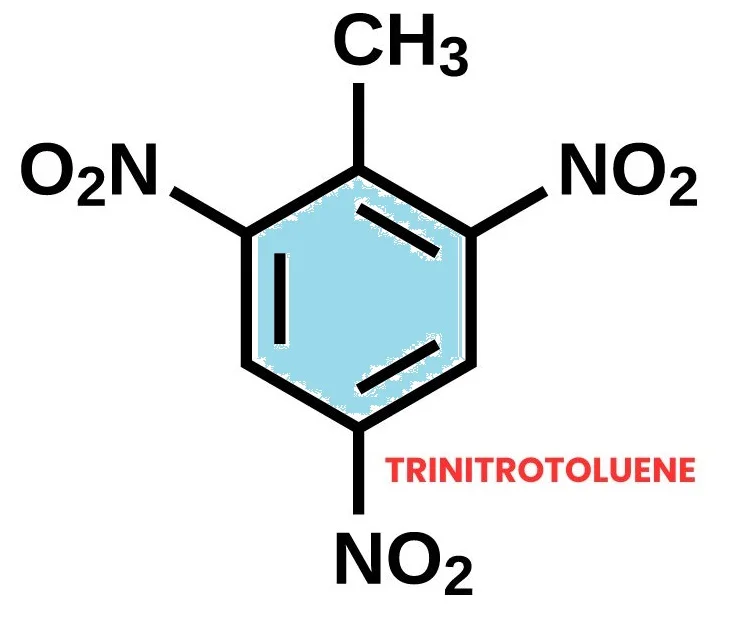Trinitrotoluene (T.N.T.) is widely known as an explosive chemical, but it has also been observed to cause toxic symptoms in workers who are exposed to it.
This exposure occurs through inhalation, ingestion, and skin absorption.
Symptoms of T.N.T. poisoning, especially from long-term exposure, were notably studied in munition workers.
The observations were compiled and published by Dr. Conrad Wesselhoeft in 1926, detailing the destructive effects T.N.T. has on the body, particularly the red blood cells, leading to severe health issues like anemia, jaundice, and cyanosis.

Table of Contents
ToggleSOURCE INFORMATION
Scientific Classification
- Chemical Formula: C₇H₅N₃O₆
- Chemical Name: 2,4,6-Trinitrotoluene
TOXICOLOGY AND PATHOGENESIS
The key destructive action of T.N.T. poisoning occurs on red blood corpuscles.
This results in:
- Anemia: A reduction in red blood cells or hemoglobin, leading to oxygen transport issues.
- Jaundice: Caused by cellular destruction rather than by bile duct obstruction.
- Cyanosis: A bluish discoloration of the skin due to poor oxygenation.
- Hemoglobin Dysfunction: Hemoglobin is altered and unable to carry oxygen effectively, leading to multiple symptoms involving the cardiovascular, respiratory, and muscular systems.
KEY SYMPTOMS
GENERAL SYMPTOMS
- Anemia and Breathlessness: Inadequate oxygen transport leads to fatigue, muscle cramps, cyanosis, and shortness of breath.
- Fatigue and Muscle Cramps: General exhaustion and cramping of muscles due to a lack of proper oxygen supply.
- Cyanosis: Bluish discoloration of the skin, especially in the later stages, caused by poor blood oxygenation.
HEAD
- Depression and Frontal Headache: Workers exhibited mental sluggishness, apathy, and easily wept.
- Dizziness and Faintness: A result of poor oxygen supply to the brain due to hemoglobin dysfunction.
- Delirium, Convulsions, and Coma: In severe cases of poisoning.
- Darkened Face: Often associated with severe cases of anemia or cyanosis.
RESPIRATORY SYSTEM
- Nasal Congestion: Dryness in the nose, with a sensation of it being stuffed.
- Coryza: Nasal inflammation often leading to sneezing.
- Burning in the Trachea: Causing a feeling of choking and heaviness on the chest.
- Dry, Convulsive Cough: Accompanied by the expectoration of mucus plugs.
GASTROINTESTINAL SYSTEM
- Bitter Taste and Thirst: Sour regurgitation and a burning sensation behind the ensiform cartilage.
- Nausea and Vomiting: Common gastrointestinal responses to poisoning.
- Constipation Followed by Diarrhea: Cramps often accompany these alternating symptoms.
CARDIO-VASCULAR SYSTEM
- Palpitation and Tachycardia (Fast Heart Rate): Rapid heartbeat due to the lack of oxygen.
- Bradycardia (Slow Heart Rate): Anomalous slowing of the heartbeat.
- Intermittent Pulse: The pulse can become irregular or difficult to feel.
URINARY SYSTEM
- High-coloured Urine: Likely due to haemolysis (breakdown of red blood cells).
- Burning Sensation During Urination: Sudden urges to urinate, sometimes leading to incontinence or retention.
SKIN
- Yellow Staining of Hands: Direct exposure to T.N.T. causes a yellow discoloration of the skin.
- Dermatitis and Nodular Erythema: Red, raised, and inflamed patches on the skin.
- Vesicles, Itching, and Burning: Irritation of the skin, particularly on the exposed areas.
- Tendency to Haemorrhage: Particularly under the skin, and from the nose (epistaxis).
MUSCULOSKELETAL SYSTEM
- Tired Pain in the Back of the Knees: Muscular fatigue and discomfort are common symptoms in workers exposed to T.N.T.
MENTAL SYMPTOMS
- Depression and Apathy: Emotional dullness and indifference to surroundings.
- Aversion to Company: Preference for solitude, often accompanied by sadness and weeping.
MODALITIES
- Worse with: Alcohol, even in small amounts (1-2 drinks of whisky could induce a collapse), and tea, which produced marked aversion in those affected.
WHAT ARE MODALITIES IN HOMOEOPATHY?
TREATMENT AND HOMEOPATHIC APPROACH
- Trinitrotoluene in the 30th potency has been used with success in homeopathy.
- The potency is chosen to alleviate the toxic symptoms experienced due to T.N.T. exposure, focusing on improving oxygen transport and alleviating the symptoms of anemia, jaundice, and cyanosis.
RELATIONSHIP WITH OTHER REMEDIES
Compare with
- Zincum metallicum: Known for treating symptoms involving nervous system fatigue and anemia.
- Phosphorus: Effective in treating hemorrhages, jaundice, and oxygenation issues.
- Cina: Useful in cases of irritability and anemia.
- Arsenicum album: For severe fatigue, weakness, and respiratory issues.
- Plumbum metallicum: For deep nervous exhaustion and muscular weakness, especially with cyanosis.
Frequently Asked Questions
What are the primary effects of T.N.T. exposure on the body?
- T.N.T. primarily affects the red blood cells, leading to anemia, jaundice, cyanosis, and overall oxygen transport issues.
- Other symptoms include respiratory, gastrointestinal, cardiovascular, and skin-related problems.
How can T.N.T. poisoning affect mental health?
- Individuals exposed to T.N.T. may experience depression, mental sluggishness, and a tendency to avoid social interaction. In more severe cases, delirium, convulsions, and coma may occur.
Can homeopathy help in cases of T.N.T. poisoning?
- Yes, Trinitrotoluene in the 30th potency has been used successfully in homeopathy to manage the symptoms of T.N.T. poisoning, focusing on the restoration of proper oxygen transport and reducing the effects of anemia and jaundice.
What remedies can be compared to T.N.T. for similar symptoms?
- Remedies such as Zincum metallicum, Phosphorus, Cina, Arsenicum album, and Plumbum metallicum have similarities in treating symptoms of fatigue, anemia, and oxygenation problems.
Conclusion
Trinitrotoluene (T.N.T.) is a highly toxic substance when inhaled, ingested, or absorbed through the skin.
It causes severe systemic effects, particularly on red blood cells, leading to conditions like anemia, jaundice, and cyanosis.
The toxicology of T.N.T. highlights the need for protective measures for workers exposed to it.
Homeopathic treatment with Trinitrotoluene in lower potencies can help manage and alleviate the toxic symptoms.
